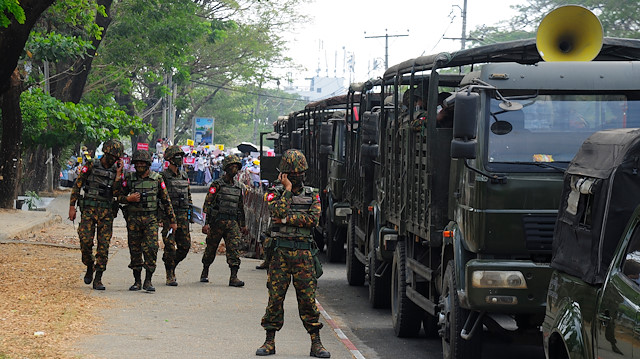
Member states of the Association of Southeast Asian Nations (ASEAN) are failing to effectively address the crisis unfolding in Myanmar since the Feb. 1 coup, a group of politicians from six regional countries said on Wednesday.
“While the brave pro-democracy protesters of Myanmar are being killed by the military junta, all other ASEAN governments are demonstrating a lack of political will and unity to pressure the military junta to end the killings,” said a joint statement by six prominent former and current lawmakers from Cambodia, Indonesia, Malaysia, Singapore, the Philippines, and Thailand.
They are Cambodian opposition leader Sam Rainsy, Indonesian lawmaker Fadli Zon, Malaysian opposition leader Anwar Ibrahim, Filipino Senator Kiko Pangilinan, former Singaporean lawmaker Charles Chong, and Kasit Piromya, former prime minister of Thailand.
Calling for a tougher approach towards the military junta, the officials said the events in Myanmar have yet again proven “the impotence of ASEAN governments in dealing with a regional crisis.”
“For decades, ASEAN governments have consistently failed to protect their peoples from one crisis to another, including transnational haze pollution, the Rohingya humanitarian disaster, and a multitude of anti-democratic and human rights abuses,” read the statement.
The officials said the ASEAN forum has been “handicapped by the self-imposed doctrine of non-interference.”
“This doctrine may have been needed in the past, but it has since become a major hindrance and stumbling block to the development of participatory democracies and the protection of the basic rights of the peoples of ASEAN,” the statement said.
- ‘Learn from Indonesia’
Fadli Zon, a member of Indonesia’s parliament, said Myanmar’s military could learn from Indonesia about a transition to democracy.
He said Indonesia was controlled by the military’s “New Order” government for over three decades from 1966 to 1998.
President Suharto, who had a military background, was finally forced to abdicate due to pressure from students and a public that called him a dictator, Zon said.
“Indonesia has had a political transition. We made changes smoothly. After that, Indonesia entered a reformation period in 1999, during which democracy was fully implemented,” he said.
Zon urged the Indonesian government to play a proactive role in resolving the crisis in Myanmar by engaging in dialogue with the military junta.
“With its experience, Indonesia can help in the democratic transition in Myanmar,” he added.
According to rights group Assistance Association for Political Prisoners (AAPP), Myanmar’s military junta has killed at least 202 people since protests erupted throughout the country against the army’s power grab.
As of March 16, at least 2,181 people had been arrested, charged, or sentenced by the military junta, the group said in a report released on Tuesday.
*Writing by Rhany Chairunissa Rufinaldo with Anadolu Agency's Indonesian language services in Jakarta














